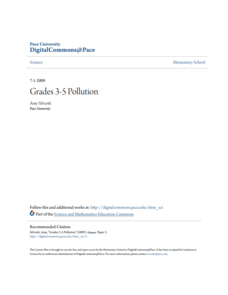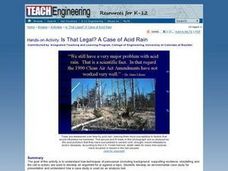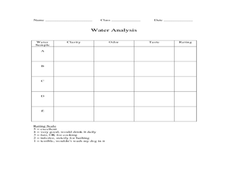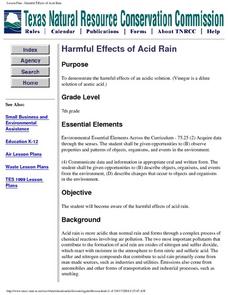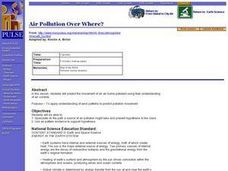Pace University
Pollution
Over the course of 10 days, scholars take a pre-assessment to place them in one of three leveled groups. Whole-class and in small groups, pupils take part in read-alouds, field trips, hands-on activities, and complete learning contracts...
NASA
The Case of the Wacky Water Cycle
Join the tree house detectives in learning about the processes of the water cycle, water conservation, water treatment, and water as a limited resource.
NASA
Cleaning Water
Give young scientists a new appreciation of fresh, clean drinking water. After learning about the ways astronauts recycle their air and water, your class will work in small groups creating and testing their very own water filtration...
Curated OER
How Pollution Disrupts Our Natural Environment
Students conduct experiments to illustrate global warming. In this air pollution lesson, students first examine how a layer of greenhouse gasses might impact the earth's atmospheric temperature, then evaluate how the layer of gasses...
Safe Drinking Water Foundation
How Water Pollution Is Cleaned Up
As a follow-up from the previous instructional activity, young environmentalists discuss the benefits of water filtration and whether or not it's the best option. Other alternatives including air stripping, bioremediation, and...
Curated OER
Is That Legal? A Case of Acid Rain
Develop an environmental case study! Elementary learners discover how a case study is used as an analysis tool. The goal of this activity is to show pupils how techniques of persuasion (including background, supporting evidence,...
Curated OER
Air Pollution: What's the solution?
In this air pollution worksheet, students compare pictures of effects caused by pollutants. There are 4 questions asked without answers provided.
WE Charity
High School–Module 2: Circular Economy and Nature
Everyone's heard the popular slogan reduce, reuse, recycle, but there may be a better way to talk about sustainability. Using the second lesson from the five-part WE Are Innovators—High School Modules series, learners explore issues...
Curated OER
Air Pollution: Visible And Invisible
Fourth graders observe air pollution that is visible and invisible with experimentation. During the experiment the students collect data that needs analysis. The observations are recorded in the lab journal. The data also is represented...
Curated OER
Air Pollution: A Local and Global Problem
Students work together to solve the problem of air pollution. Using the Internet, they research the pollution problem in one city. Using the data, they develop their own solution and pitch it to the class. They must identify the...
Curated OER
TE Activity: Pollution Politics
Students examine how a bill becomes a law in the US Congress. They investigate legislation about global warming. They determine the role of engineers as they educate Congress, the public and other government institutions about global...
Curated OER
Assessing Risks for Inhalation and Ingestion of Pollutants
Students use a hypothetical scenario to investigate inhalation of an airborne pollutant and ingestion of a waterborne pollutant. They work in pairs, investigating differences in overall exposure to contaminants by calculating inhalation...
Curated OER
Bottled Water vs. Tap Water
Learners analyze the similarities and differences between tap water and bottled water. They make informed decisions about their use of each. Students are asked if they drink mostly tap water straight from the tap or water fountain. They...
Curated OER
Is Our Water Healthy?
High schoolers test water for a least one chemical characteristic. They hypothesize how a storm event might change the chemical characteristics of a stream. Students collect water samples and use the chemical test to test the water.
Curated OER
Water Chestnut Graphing Activity
Students are taught how to format and enter data into an Excel spreadsheet. They make a graph and interpret graphed data. Students discuss possible impacts of water chestnut invasion. They graph data on water chestnut. Students report...
Curated OER
Conserving Electricity: Turn It Off
Second graders explore causes of air pollution and relate them to energy conservation.
Curated OER
Pollution
Third graders investigate pollution. They discuss pollution and its effects. They create a Venn diagram of pollution and people polluting. They create a landfill and predict what will occur over a week's time. They create two air...
Curated OER
Pollution Research
Fourth graders explore pollution. They conduct preliminary research on pollution using the internet. Students share their findings with the group. They work with a group and create lists of facts on pollution.
Curated OER
Determination of Water Hardness
Students investigate water hardness. In this water hardness lesson plan, students determine the water hardness in 4 samples of water after buffering each. By using titration and an indicator, students can determine the amount of calcium...
Curated OER
Harmful Effects of Acid Rain
Seventh graders are able to demonstrate the harmful effects of an acidic solution. They become aware of the harmful effects of acid rain. Students make predictions before they began the experiment. If vingegar contains acid, then how...
Chymist
How Do We Affect the Quality of Our Atmosphere
Explore the makeup of the earth's atmosphere. Using the set of specific experiments, pupils examine the main elements and compounds present in the atmosphere. Their study extends to investigate the effects of atmospheric pollution such...
Teach Engineering
Introduction to Environmental Engineering
A series on environmental engineering introduces the class to issues that environmental engineers work to solve. This first instructional activity focuses on air and land issues, and looks at ways to reduce pollution.
Alabama Learning Exchange
Make a Difference!
We are very dependent upon other life forms around us to survive. Here, scholars explore relationships in the ecosystem with the help of Auntie Litter and the pollution patrol. They imagine a world without grass, making connections to...
Curated OER
Air Pollution Over Where?
Young scholars predict the movement of an air borne pollutant using their understanding of air currents. They determine which governments and/or communities should be contacted to be forewarned. They also explore the properties of their...


